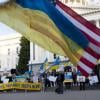
The San Francisco Choral Society will present the U.S. premiere of Ukrainian composer Alexander Shchetynsky’s Requiem on Aug. 18 at Davies Symphony Hall. The event is dedicated to the memory of Ukrainian conductor Yuri Kerpatenko, who was fatally shot last September after refusing to cooperate with Russian occupiers.
The concert includes the Mozart Requiem, but the planned U.S. premiere of another Shchetynsky work, Lacrimosa, has been canceled because it requires use of an organ, and the cost of renting Davies’s Ruffatti organ, in addition to other charges, was prohibitive for the nonprofit organization of auditioned volunteer singers.
Tickets range from $45 to $75, with discounts available for seniors and students, from City Box Office or by calling (415) 392-4400.

As usual for the chorus, the concert includes both local and visiting singers, rehearsing and performing under Artistic Director Robert Geary, winner of the 2023 Chorus America Michael Korn Award.
The SF Choral Society’s Summer Festival Chorus program brings experienced singers from across the country and beyond to join its Resident Chorus for one week each summer in San Francisco.
Participants in this year’s program are coming from as far away as Singapore and are a broad range of ages. The SF Choral Society also sponsors a student scholarship program that invites local high school and college students to participate in the rehearsals and performance.
The soloists in the Shchetynsky Requiem are soprano Jessica House Steward, mezzo-soprano Stacey Helley, tenor Lee Steward, and bass Sidney Chen; House Steward has been the SF Choral Society’s executive director since 2019.
In the Mozart Requiem, the soloists are soprano Emily Sinclair, mezzo-soprano Shauna Fallihee, tenor Michael Jankosky, and bass Eugene Brancoveanu.

Shchetynsky, 63, graduated from the Kharkiv Art Institute in 1983. Besides such Ukrainian composers as Valentyn Borysov and Valentyn Bibik, Shchetynsky was strongly influenced by the Soviet musical avant-garde of Edison Denisov, Alfred Schnittke, Arvo Pärt, and Sofia Gubaidulina.
Written for mixed choir and strings, Shchetynsky’s Requiem had its world premiere in 2004 at the Contrasts Festival in Lviv, Ukraine. The composer describes his use of “a musical metalanguage” that incorporates “stylistic elements from various periods: Gregorian chant and early polyphony, Baroque figures, operatic melodies of the 19th century, and modernistic innovations of the 20th century ... into one discourse, making the transitions from one style to another imperceptible.
“I aim at overcoming eclecticism and finding a new unity in the combination of those musical elements that historically never existed next to each other.”
Shchetynsky’s Lacrimosa, originally planned for the Aug. 18 concert, is an instrumental work for violin, oboe, horn, two trombones, and organ. It was composed in Kyiv during the first weeks of the Russian invasion and is described as “a sorrowful song of mourning for the people who have perished in the war and for the country suffering from destruction. It is also a powerful hymn to the spirit of the Ukrainian people.”
Shchetynsky’s music has been performed across Europe and North America by such ensembles as the Helikon Opera in Moscow, the BBC National Orchestra of Wales, and the Warsaw Philharmonic. Two albums featuring his music have been released, including the 2011 Naxos recording New Sacred Music From Ukraine and the 2016 Labor recording Ukraine: Journey to Freedom.
In 2000, his chamber opera Annunciation received a prestigious Golden Mask award in the category of innovation. He has also won prizes at the Witold Lutosławski International Composers Competition in Poland and the Henri Dutilleux Competition in France, as well as placing for the International Gustav Mahler Composition Prize.




